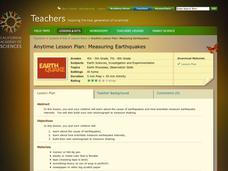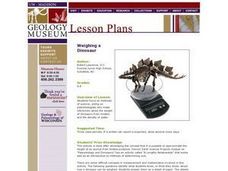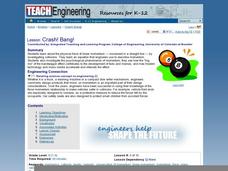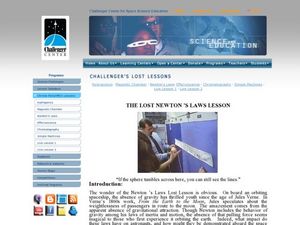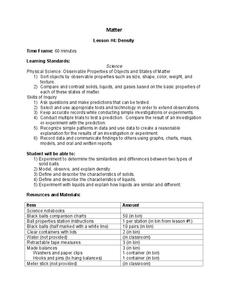California Academy of Science
Measuring Earthquakes
After a brief discussion on earthquakes, make a makeshift seismograph to record the shaking of the table that it sits upon. While the background information will be useful to you as a teacher, the seismograph does not seem like it would...
NASA
Christa's Lost Lesson: Effervescence
How are chemical reactions affected by gravity? Learners explore the phenomenon of effervescence as part of the Christa's Lost Lessons series. They compare findings in an experiment on effervescence to a video of a similar experiment in...
Curated OER
Popcorn Neutrino Lab
High schoolers parcticipate in a modeling activity that simulates the cyclical role of experimental and theoretical science. Initially, students measure the mass of popcorn. They also record predictions of the mass of the kernels after...
Curated OER
Einstein's BIg Idea
Pupils discuss what the m in E=mc2 represent. They relate that mass in a chemical reaction is always conserved. Students convey that atoms rearrange themselves in chemical reactions to form different molecules and compounds.
Curated OER
Glacier Dynamics
Students create flubber glaciers. In this glacier dynamics lesson plan, students experiment factors that may affect glacier speed. Factors include slope, ice temperature, and basal conditions. Students develop hypothesis, conduct...
Curated OER
Weighing a Dinosaur
Students role play as paleontologists who make inferences about the weight of dinosaurs. They use models and the density of water to make these inferences.
Curated OER
Crash! Bang!
Students study the physical force of linear momentum by investigating collisions. They analyze the difference between elastic and inelastic collisions. They calculate linear momentum.
Curated OER
The Lost Newton's Laws Lesson
Students explore momentum. In this physics lesson, students perform an experiment in which two balls are released on slanted boards while students observe which ball will go the farthest and the fastest. Students define and explain...
Cornell University
Buoyancy
Swimmers know to float by turning their bodies horizontally rather than vertically, but why does that make a difference? In an interesting lesson, scholars explore buoyancy and the properties of air and water. They test cups to see which...
Curated OER
Air Resistance and Friction
Physics learners experiment with three laboratory activities to learn about air resistance and friction. First, they use a hair dryer to move different sized spheres to determine the relationship between cross-sectional area and air...
Curated OER
Thirsty Rocks: Please "Porous" a Drink!
A simple activity goes a long way in demonstrating the property of porosity to your rock hounds. They will mass a specimen of dry sandstone and then soak it in a pre-measured amount of water. After seven minutes, they once again measure...
Curated OER
Busted Bubbles
Using the scientific method, and bubble gum, learners conduct a motivating experiment. After conducting a series of tests involving bubble gum, they graph and analyze their results. This is the type of activity everyone loves.
Curated OER
Intrinsic Viscosity
Students treat a high molecular weight polyvinyl alcohol polymer with potassium periodate. They measure the viscosity of polyvinyl alcohols.
Virginia Department of Education
Laboratory Safety and Skills
Avoiding lab safety rules will not give you super powers. The lesson opens with a demonstration of not following safety rules. Then, young chemists practice their lab safety while finding the mass of each item in a mixture and trying to...
Teach Engineering
What Floats Your Boat?
Clay's as good a material as any to build a boat, right? An introductory lesson sets the stage for two activities associated with buoyancy. The first involves building boats out of clay, while the second uses these boats to measure the...
Cornell University
Thin Films
Combine mathematics and science to calculate measurements of unmeasurable materials. Individuals use knowledge of density and volume to determine the thickness of the film used in production. They also apply stoichiometry to...
Curated OER
Density
Learners predict when an object will float or sink based on comparison of density of the object to the density of the substance in which it is placed. The access a website and sketch the object in the first column of their table and then...
Curated OER
Bloodstain Pattern Simulations: A Physical Analysis
Learners receive bloodstain pattern evidence from a crime scene. They answer a series of questions through inquiry, observation, measurement, and analysis. Pupils complete this challenge, by reconstructing the evidence through four...
Curated OER
Balancing The Day Away In Grade 2
Second graders sped the day exploring about balance by playing with and making balancing toys. They discover how varying the amount and position of mass affects the toys' balance. Pupils explore gravity and balance while playing with the...
Chymist
Plop, Plop, Fizz, Fizz
One of the most recognizable commercial melodies was written in 1977, and led to gastronomical relief around the world. Scholars use Alka Seltzer tablets to measure reactants and calculate the chemical equation for the reaction of NaHCO3...
Cornell University
Mechanical Properties of Gummy Worms
Learners won't have to squirm when asked the facts after completing an intriguing lab investigation! Hook young scholars on science by challenging them to verify Hooke's Law using a gummy worm. Measuring the length of the worm as they...
Curated OER
Metric Magic
Sixth and seventh graders construct a "metric machine" as a kinesthetic aide in converting from one unit to another in grams, liters, or meters. They complete a metric activity on the Internet and view about five minutes of a video on...
Perkins School for the Blind
The Mystery Box - Making Observations and Collecting Data
Making observations and collecting qualitative and quantitative data is a vital skill all scientists need to practice. Help your scientists with partial and no sight learn how to use their other senses to make observations for...
University of Texas
Lives of Stars
Stars exist from a few million years to over 10 billion years, depending on their mass. Scholars perform a play acting as stars to learn about their different life cycles. They develop an understanding of many of the fundamental concepts...
